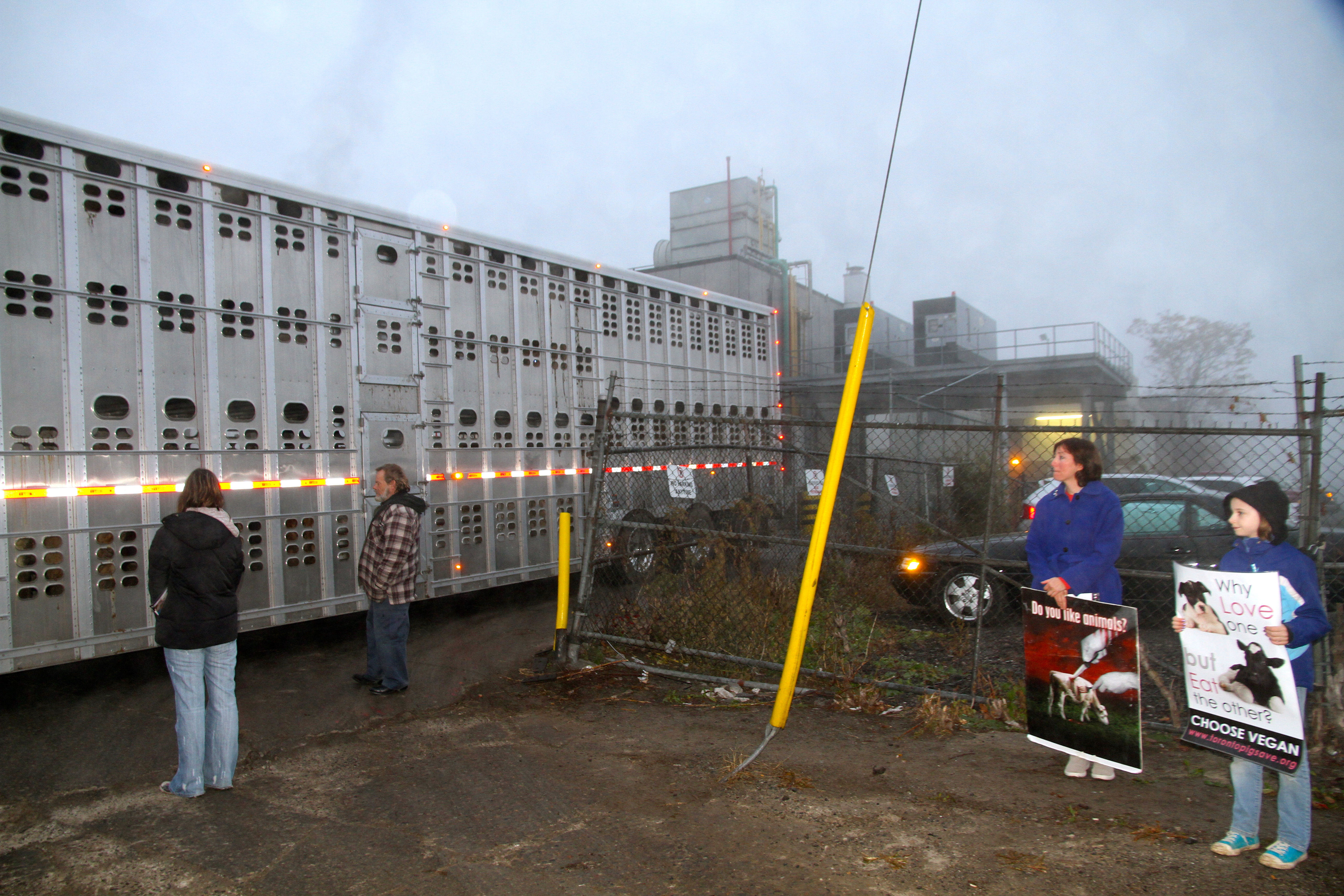Leo Tolstoy, “February 21” entry in his Calendar of Wisdom:
“The killing and eating of animals is a prejudice accepted by those who think that animals were given to people by God to eat, so that there is nothing wrong in killing them. This is not true. It may be written in some books that it is not a sin to kill an animal, but it is written in our own hearts more clearly than in any books — that we should take pity on animals in the same way as we do on each other. And we all know this, if we do not deaden the voice of our conscience inside us.”
* * *
I visited this morning — for the first time — a cluster of abattoirs in Northwest Toronto. Tucked behind St. Clair Avenue West and Weston Road are St. Helen’s Meat Packers Ltd., Genesis Meat Packers, Inc., and Ryding-Regency Meat Packers. At 7 a.m., as I turned from St. Clair onto Gunns Road, I was first greeted by the smell that is unmistakably that of slaughter. Then, emerging through the fog, I saw a chip-truck style trailer with shoddy signs advertising different cuts of meat. It was clear I had left my Toronto and entered quite a new place.
Over the course of 2 hours, the site emerged as a bizarre intersection of faith and horror. The invocation of St. Helen (one of the more obscure saints, she was a martyred virgin in the year 480) was perplexing. Across the street, Genesis alluded to that notorious passage from the Old Testament that gives humans “dominion” over animals. A slew of rabbis entered Ryding-Regency/Genesis Meat Packers one after another to perform “kosher slaughter”. Another worker graciously reminded us that God created cows for food, and dogs for companionship. All of these ecclesiastical themes and yet this was one of the most unholy places I have visited.
As always, animals being delivered in transport trucks evoked a deluge of sadness: their sad, fearful eyes, their filthy, feces-ridden bodies, their lack of autonomy and dignity.
Yet there were glimpses of humanity and hope.
A gentleman sipping a cup of coffee had just interviewed for a job at Ryding-Regency, at the behest of his daughter who referred him there after his prolonged unemployment. He said he would take whatever position they gave him. This reminded me that meat-eating is palatable to most people only because they don’t have to do the dirty work, as it were. It’s someone else’s job to cut the animals into pieces and turn them into food. Another worker said he had been assigned to St. Helen’s by an employment agency and wanted a new job.
As a crowd of workers took their morning coffee break outside, I wanted to talk to them and find out how they ended up working there, if they liked their jobs, if they had other aspirations. I know what it feels like to be stuck in a job I don’t like, so there was common ground. I was, however, timid, and did not want them to feel judged or patronized. Maybe some of them like their jobs. The point is that the people doing this work can often have close to as little choice as the animals appropriated into the factory farming industry. If there were other options (better jobs, better pay), wouldn’t they take them?
We mustn’t underestimate the power and importance of connecting with workers, esoteric as these companies may be. But we’re all people, and through the fogs of religion, secrecy, avoidable antagonisms, and bad habits, surely we can talk about what is written on our hearts and find affinities.
—
Chris is an emerging playwright and screenwriter based in Toronto. His company Theatre Under Pressure debuted with Weight Loss World in 2010 and has several projects in development including The Rope, an exploration of the corrosive interpersonal effects of the philosophy of Ayn Rand, and A Long and Ghastly Kitchen, a drama about vivisection. Chris is the caretaker of a pug and is an ally of all animals. You can reach Chris at [email protected].
Photos by Anita Krajnc for Toronto Cow Save.



